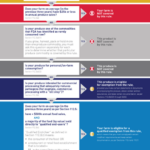Are you crystal clear on the purpose of plant-back restrictions and on the length of time required between a herbicide application and the planting of your next crop or cover crop? If not, the guidance below should help. It was developed based on a poster presentation made during the 2022 annual meeting of the Weed Science Society of America (WSSA). For further information regarding the plant-back restrictions for vegetable crops, please refer to Pest Management section (p. 110-118) of the 2022/2023 Commercial Vegetable Production Recommendations.
- What is a plant-back interval?
A plant-back interval is the minimum period of time between a pesticide treatment and the planting of your next crop. The EPA establishes plant-back intervals as label requirements for herbicides, insecticides, fungicides, plant growth regulators and other types of pesticides. - What’s the purpose of a plant-back interval?
EPA’s primary focus in setting plant-back intervals is to protect human health by preventing over exposure to pesticide residues in crops – including fruits and vegetables. Regulatory experts include all residue sources when assessing human dietary exposure. - Do plant-back intervals also address crop phytotoxicity concerns?
While pesticide registrants may choose to add label instructions to address potential crop injury or phytotoxicity concerns, these instructions are independent of EPA-mandated plant-back restrictions that focus on limiting human exposure to pesticide residues. If your crop is intended to be harvested for human or animal consumption, you must still comply with the minimum residue-based plant-back intervals, regardless of whether phytotoxicity guidance is given. - How are plant-back intervals established?
EPA requires that pesticide registrants submit residue studies to document pesticide levels and related metabolites. Study data is then used to develop appropriate plant-back interval guidance based on allowed tolerance levels in the plant-back crop. All residue sources from pesticides applied within the current and previous growing seasons are included when assessing human dietary exposure. It is important to note that the plant-back intervals specified by EPA are crop specific. The interval specified for tomato, for example, might vary from that established for cole crops. - What should I do if I’m planting a crop that isn’t specified on the label?
Crops that are not specifically addressed on the label fall into the “other crops” category and require the maximum plant-back interval indicated on the label. - Do plant-back intervals apply to both my rotational crop and my cover crop?
If the crop is harvested for human consumption or is grazed by or fed to livestock that will be consumed by humans, the crop is considered a “rotational crop” and requires an appropriate plant-back interval to protect human health.
Seasonal plantings that will not be consumed directly by humans or by livestock that will then be consumed by humans are considered “cover crops.” Cover crops such as ryegrass or hairy vetch are grown to improve soil quality, reduce erosion or manage weeds. Since there is no risk of dietary exposure, plant-back restrictions do not apply when planting cover crops. - How do I calculate the plant-back interval?
To comply with the mandated plant-back interval, use the date of the last pesticide application as a starting point. If, for example, the crop selected has a 365-day plant-back interval, the 365-day window begins on the day after the last pesticide application to the previous crop. You can plant that next crop 365 days later.

